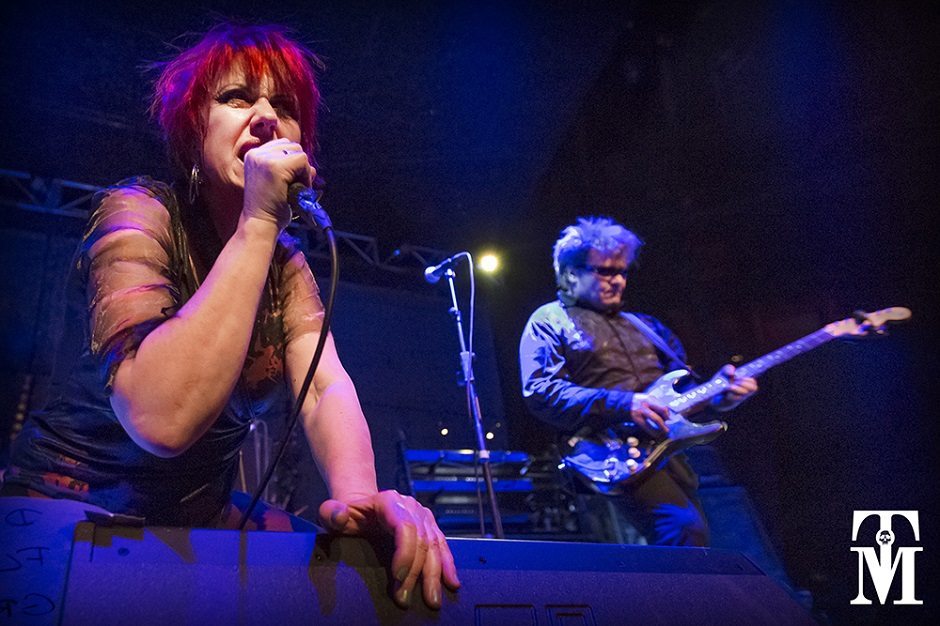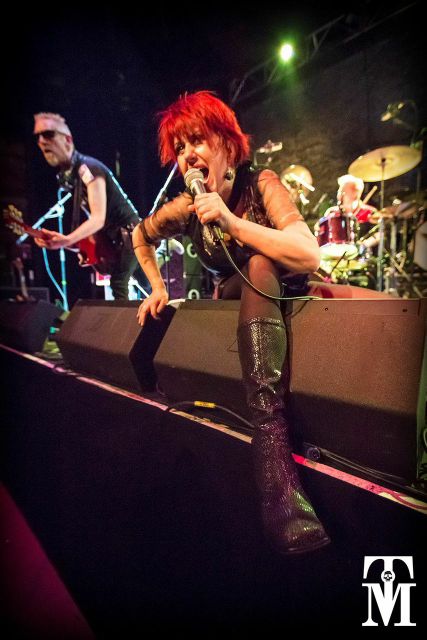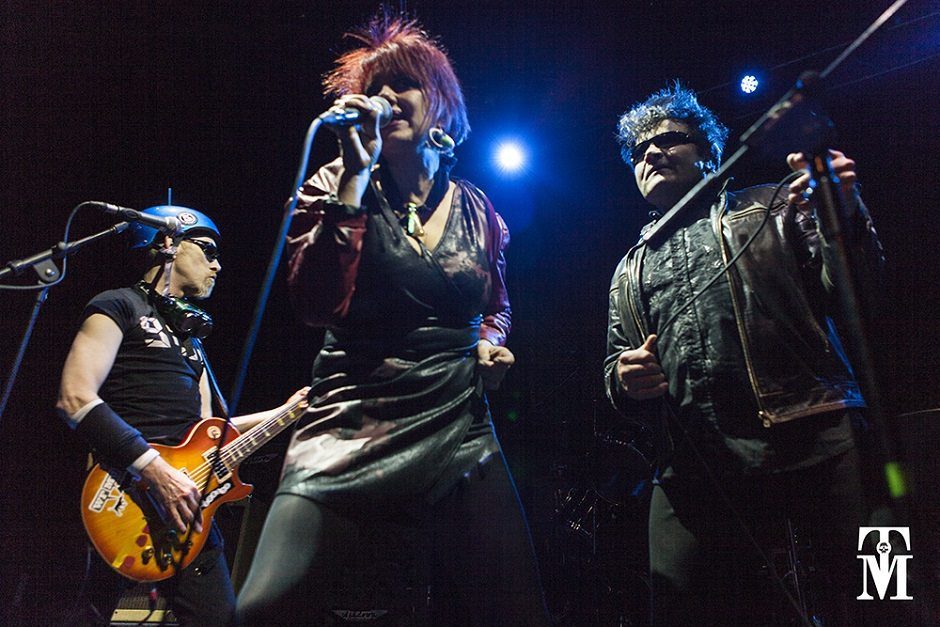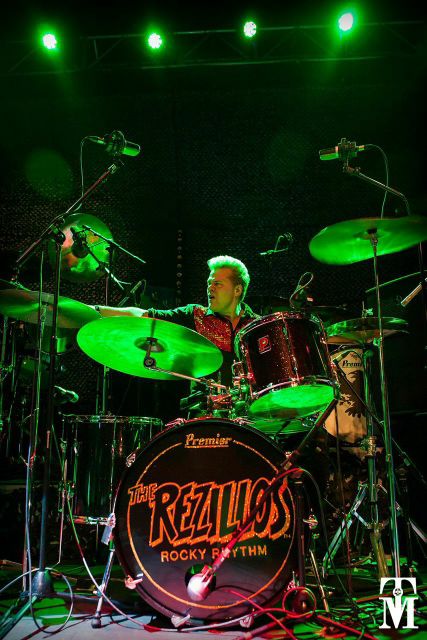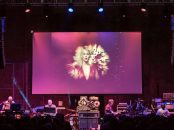[dropcap style=”font-size:100px; color:#992211;”]W[/dropcap]ith a production rate that would make The Stone Roses seem like workaholics, The Rezillos are back with their second album, Zero half a lifetime after their well received 1978 debut, Can’t Stand the Rezillos.
Emerging from art college in Edinburgh, they had a quirkiness of their own with cartoon imagery belying their depth. Mislabelled as B-movie kitsch due to their beat outfits and flying saucers lyrics, rather than swearing at old Mr Grundy they were subversive in a more considered manner performing their cultural critique Top of the Pops track on that very show.
Life has moved on, guitarist Jo Callis (co-writer of The Human League’s Don’t You Want Me) is no longer a member of the party but front-people Fay Fife and Eugene Reynolds are revitalised and keen to re-establish themselves.
Unfairly often omitted from the history of women in punk and new wave music, Fay Fife has the vocal inflections of Siouxsie, the presence of Poly Styrene, the glamour of Debbie Harry and the eccentricity of Ari Up. But there’s something else here too – a strong voice in all senses of the word, which owes as much to the kitchen sink divas and girl groups of the 1960s as to the power of the three chord anthems. A voice which has lost none of its vivacity almost four decades since she burst onto the nation’s teatime viewing.
I spoke to them just before they went onstage to support The Stranglers at The Roundhouse in Camden.
Fay, do you think that things are better or worse for women in music now?
Fay Fife: This is a question I’m very concerned about. In my view some of the problems that have always been there are still there. I think that things have changed on the surface but I don’t think that they have changed underneath.
I think women have a lot projected on us and I think it’s quite hard to resist that. How you use your identity or how you play with your identity as a woman in rock ‘n’ roll can be quite challenging. People have ideas of what you’re like and it’s usually very stereotypical. Men have it too but for women the stereotypical identities are more compromising.
You’re a huge fan of Dusty Springfield and The Shangri-Las. Who else do you consider to be female role models?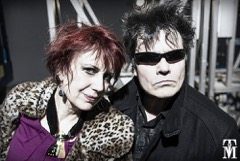
FF: I’m going to stick with Dusty and The Shangri-Las. Dusty has such a beautiful voice, a totally unique voice. I think she struggled a lot; she struggled with her identity, as you know she was a gay woman, and she struggled a lot to find a place in what she did. I just admire the beauty of how she sang things.
The Shangri-Las are not so much role models as touchstones. I love them because they have this identity of taking something and turning it upside down on its head and putting it back out there. It accesses stereotypes but goes beyond that and becomes something different.
A major inspiration and I guess a role model is Dolly Parton and also Stevie Nicks. I’m a huge country fan as well as a huge R ‘n’ B fan. I just like Dolly Parton because she does this thing where she’s totally authentic but at the same time has a created reality that runs alongside it, so it’s double-edged. So I like what she does with her identity. Also she’s a fantastic songwriter, an amazing singer and a really beautiful guitar player.
Stevie Nicks I like because she’s really uncool and really unfashionable for a lot of people – this floaty blonde woman with all this chiffon. She’s out-dated in a way but she’s completely real and completely authentic. I think she struggled and I like that she’s kept on, she’s dedicated to music. I hear some of the things she’s said in relation to her personal life and music and I admire her. I don’t mind putting that down in print because she’s so unfashionable that people don’t expect me to.
You’ve done many other things between now and the initial incarnation of The Rezillos. Did you always know that you would come back to music?
FF: Music claimed me and I ran it away from it but it came and got me anyway and after a while I stopped struggling. As I turned into my late 20s, early 30s I actually felt music didn’t really want me and I was pissed off with it. I wasn’t really pissed off with music; I was pissed off with the music scene. If you have a career, at some point you’re going to be deeply unfashionable and so at that point, I was deeply unfashionable.
At the same time it interfered with my personal life and caused a lot of distress. I just couldn’t hack it any more and I wanted something that was a bit more peaceful.
Also at certain points I wanted something that was using my brain a little bit more. Of course music uses your brain but it’s your creative mind, not your intellectual mind.
Eugene and I both have a lot of creative and intellectual interests but whatever I do, music is the main thing and it’s claiming me more and more and I’m more than happy to be claimed whereas before I was resisting.
You mentioned being unfashionable at one point but it’s clear now that The Rezillos are enjoying resurgence in popularity. Do you think that you would still want to perform if that hadn’t happened – if you were playing to five people in a pub rather then supporting The Stranglers at The Roundhouse?
FF: I like both – I like hot little clubs and I like bigger places. I don’t know why but I find it very natural to perform, it just seems to be a natural place. You need an audience but I just have the urge to perform.
Do you think that you will always make music with Eugene?
FF: I think Eugene and I have a really productive, creative relationship and it’s a really dynamic one. We don’t always agree with each other, in fact we disagree a lot but it’s almost like we spark off each other. If we’re put in a room, we will come up with something. Even if we don’t like it, we will come up with something. If we’re put in a room for a week, we’ll come up with a couple of things we like, creative ideas. They might be visual ideas as well as musical ideas.
Eugene is one of the most creative people I’ve met in my life and I would always want to keep that creative relationship going. But I don’t see that it has to be just us two. We might do things outside that. I’ve collaborated with visual artists, a classical composer and so on. I want to be creative and I want to go where my creativity leads me but at the same time my creative relationship with Eugene will still stand whatever happens.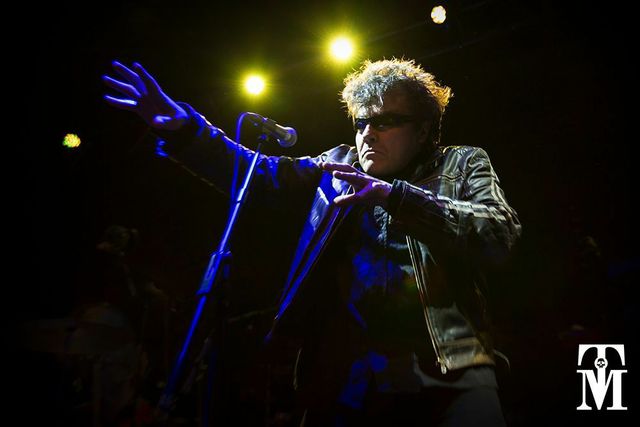
Without wishing to downplay the rest of the band, would you say that the two of you are the creative hub of The Rezillos in the same way that Lux and Ivy were the creative hub of The Cramps?
Eugene Reynolds: People think that and to an extent there is a certain hub but we strive to be inclusive in everything we do. When we have people in the band, we ask them for their input and sometimes we use it, sometimes we don’t. I think we tend to be more inclusive than exclusive but because we’re front people, we almost get artificially separated from people by outside forces. That tended to happen with The Rezillos in the early days and it wasn’t actually good for the group.
FF: I would say this – I think we are the creative hub but I think the people we work with are really, really important. The band that we have at the moment is really great to work with. These people bring something really special but there is also this creative hub and that would be there whatever.
What is more important to you – music or performance?
ER: Music. We discussed that even if we didn’t perform again, we would still be making music.
In the past, you’ve been seen more as a live band than a recording band….
ER: Yes, well we need to change that perception.
FF: I think we need to change that perception but I think it’s our responsibility that perception is around because it took us so long to go into the studio and do anything. We feel very comfortable in a live situation, it’s like a comfort zone, but the music, the song writing and the recorded performances are by far the most important thing.
So how does your song writing work? Do you each turn up with your own ideas or do you collaborate from the outset?
ER: It very quickly becomes collaborative but generally one or other has an idea and then the other gives input. To an extent we modify one another’s ideas somewhat and sometimes we augment one another’s ideas. Sometimes a song may start off as just a title. I think the difference now compared with when we started to write songs some decades ago is that we see threads of things that can be the whole spine or backbone of a song whereas before we saw them in sections. Now we just take one simple aspect and develop along that rather than throw everything and the kitchen sink in. A lot of the songs might appear simplistic but it took a lot of paring down to get to the essence of what we want to express.
FF: One of the songs on the new album, you might not remember this Eugene but there’s one part of the melody that was just floating around for months and joined onto various different song ideas but then the idea for Spike Heel Assassin came in and that part of the melody came in on that.
ER: Yes, suddenly when you just juxtapose one idea against another, it takes on a different life.
FF: Some songs come in quite bizarre ways. I think it’s unusual but some of them just come from above, they just come down and I think that’s pretty weird. On a plane going to Spain the lyrics from Tiny Boy from the new album just came to me and I put them in the phone. The melody was there as well and I was like, where on Earth did that come from?! We’re both inspired by strange lyrical ideas or conceptual ideas and that gets us going. That zones us in. We’ll say something that tickles us. One that’s on the go at the moment where there are lyrics but no melody is Constance Duplicate.
ER: A Day in the Life of Constance Duplicate. Sometimes a title just suggests something to the head. Now of course it usually suggests something quite different to Fay than to me and then we’ll bring those two ideas together and they’ll become mashed up into a new meaning.
FF: I’m not saying they’ll interest or inspire other people but they interest and inspire us.
ER: Rather than explain to people what our lyrics mean, it’s better that people explain to us what they think our lyrics mean because usually that’s interesting; they’ve made their own thing out of it.
You’ve said in the past that critics have overplayed the sci-fi B-movie element of your lyrics…
ER: Yes, people always have to find an angle and they take unfortunately what they think is the most obvious angle and to us, it isn’t. Actually a lot of our songs have nothing to do with science fiction at all.
FF: Though ironically one or two have. There are songs that we do that allude to science fiction but they’re not about that, we’re using that as a metaphor for something else in the same way that science fiction used ideas as a metaphor itself. Going back to 1950s science fiction, they used it as a metaphor for “the other”, for the unknown, for alienation, for fear, for adventure. So we’re using it as a metaphor we well.
ER: Those metaphors that are consistent with sci-fi, those are metaphors for everyday life as well – alienation, where are we going, what is my future, what is your future, is there a future? It’s the same thing that motivates people’s fears, thoughts and dreams. Take science out of it and just call it fiction; everything is fiction. Even your interpretation of your everyday life – to other people, it’s a fiction. It’s a story and what’s true to you might not be true to someone else.
FF: The other thing people have said is that we’re quite cartoony and I would say the same kind of thing as for the science fiction thing. We use ideas that could be quite cartoony or quite stereotypical and put other ideas into it because that amuses us. For example we have a song on the new album called Life’s a Bitch and it’s quite a stereotypical thing to say. So we write about that stereotypical idea and put something else into it. It’s the same as what Dolly Parton does. I’m not saying we’re in the same class but that’s why I admire her, that’s what she does. She’ll take a stereotypical idea of a curvaceous, sexy, tiny, wee woman with a blonde wig but then put something real inside that.
You famously sang your song ‘Top of the Pops’ on Top of the Pops. Given where we are now, do you look back on Top of the Pops in a more affectionate way these days?
ER: Yes, it’s no different now; people are still told what to think and what to listen to even more. Actually Top of the Pops looks very liberal compared to X Factor, doesn’t it? I think it’s a disaster. I can’t understand how, in a country like the United Kingdom where music is so endemic, where it’s part of the fabric of people to make music in such a creative way, for it to be almost ignored by the constant need for children in schools to reach academic levels and for them to reach these performance tests.
If we applied to go to art college now, we wouldn’t get in because we don’t have the right qualifications in mathematics. I just don’t understand where they’re coming from. When it comes to Top of the Pops and Old Grey Whistle Test, even though at the time we were annoyed with them, we probably didn’t realise how good we had it until we now see, here we are with this nihilistic future.
To me, X Factor is a cartoon. They’re looking for either people that they can build up or people that they can deride and likewise with Big Brother. The way TV is, to me, is on the flat level of a banal cartoon.
Taking that into the level of music, where we are, it’s just plain wrong to see what we do as a cartoon. 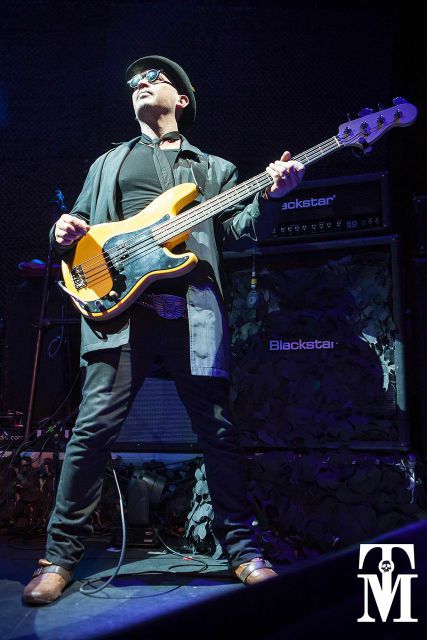 Maybe what we did was making that mistake of putting some cartoons on our first album; maybe we made a mistake of having those covers, although it made sense to us at the time. This album has no cartoons; we chose to stand apart from that.
Maybe what we did was making that mistake of putting some cartoons on our first album; maybe we made a mistake of having those covers, although it made sense to us at the time. This album has no cartoons; we chose to stand apart from that.
The new album, Zero certainly demonstrates that you’ve lost none of your energy.
ER: Well that’s after a long hiatus! We’re not tired with it; we’re not fed up with it.
FF: I think it would have been better if we didn’t have the hiatus but that’s the way it is.
ER: I think we’ve found our stride a bit more and proven to people that we can write songs because early on, the credit was given to another songwriter.
FF: We have got a very busy year this year. We’re touring now, we’re touring America but we’ll continue writing towards the end of the year and we’ll certainly not be leaving it as long as this album. I think Eugene is right, we have got into our stride and we need to build on this energy.
ER: We are building on it. We’ve got scores of other songs and some that we didn’t put on this album because they weren’t finished in time so there is already an amount of songs that can go on a third album and certainly a huge amount of other songs that we can draw upon and ideas.
FF: We need to keep the energy going and we need to keep the momentum going. We’ve got some very good reviews for this album already and that’s very gratifying. We just need to keep the energy up.
On a completely different note, what are your views on Scottish independence?
FF: You’re going to get the whole gamut of views because I’m very positively yes….
ER: Well, I wouldn’t make a secret of saying that I think the United Kingdom is more important. I think there would have been a stronger argument for it before people were so mobile. I mean, I’m not even Scottish but I’ve been in Scotland for over 40 years and a lot of Scottish people have moved away a long time ago and live in different countries. I just think that the world is more of a melting pot. Clearly the division has polarised people but I think it gave people a chance to consider their politics more and in a more direct way and I think that was very important. It opened up some wounds among some people and for others it made us realise that we should consider ourselves all as one family in a big world. So I think there was some degree of difference in the band but that’s no different to anything else in this band!
FF: Jim and myself were the most positive “yes”. The band encapsulated how things were done in Scotland – we had different views about it but we were quite happy to have the different views. We didn’t fall out about it, we just talked about it and had debates and respected each other’s views. I think that’s largely what happened in Scotland.
ER: I just wanted to make a badge that said “Yo” on it!
FF: Certainly it’s changed the landscape in Scotland. People believe in the power of having a political voice and I think people had become disillusioned prior to that so that change in itself is a good thing.
Fay, is your psychology training helpful when dealing with musicians?
FF: It helps me with music certainly. Before I got into psychology, I fancied thinking analytically but never really did it, but then I got into that. It’s quite a good reflective tool. Do you think me being a psychologist has helped us Eugene?
ER: No (emphatically)
FF: (Laughs) If you ask anyone, they’re bound to say I’m the craziest person so it hasn’t helped in that way either!
Words copyright Sarah Corbett-Batson
Photographs copyright Carl Byron Batson
Not to be reproduced without express prior written consent

